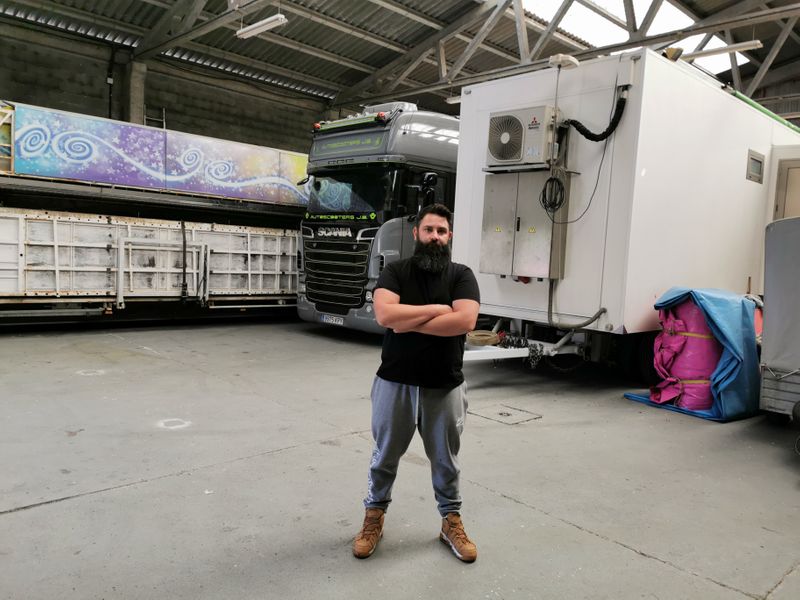MADRID (Reuters) – Brother and sister Juan and Dolores Balsa applied for emergency state loans in April to keep their funfair business in the northern Spanish city of Coruna afloat despite having to shut because of the pandemic.
But with a second wave of coronavirus infections keeping the bumper cars and toddlers’ joy ride firmly shuttered, they lost out on the late-summer revenues they hoped would help pay off the loans. Now, the family business is in a fight for survival.
Their plight is being mirrored by other small enterprises across Spain, whose economy has been the worst hit in Europe but which cannot offer the same level of support to its companies as its wealthier neighbours to the north.
“We need to pay for a lot but there’s no money coming in,” Dolores, who runs the toddlers’ rail circuit, said as she listed the mountain of fixed costs from insurance premiums through to expenses related to their truck that keep building up.
Spanish companies already endured one of Europe’s toughest lockdowns earlier this year as the country became one of the region’s epicentres for the virus. A fresh surge in infections is compounding the hit to the economy, which is expected to shrink by more than 11% in the year as a whole.
Yet fiscal aid to prop up the economy only amounted to 3.7% of GDP against 8.3% in Germany, the Brussels-based think-tank Bruegel estimates. That left small Spanish companies rushing to take up short-term loans as their only lifeline.
“The greater recourse to guaranteed loans in Spain can be partly attributed to the lower availability of alternative fiscal relief measures for corporations,” the European Central Bank said in its September bulletin.
Spanish companies have taken 102 billion euros of emergency loans compared with 70 billion by their German counterparts, which the ECB noted had access to “other policy measures”. One such support is the generous “Kurzarbeit” wage subsidy scheme.
All across Europe, policy-makers face the dilemma of deciding which businesses have been made unviable by the pandemic and so should be allowed to fail, and which are facing short-term difficulties and should be kept afloat.
Alicia Coronil Jonsson, chief economist at Singular Bank, says it is patently clear that once the pandemic abates, the tourism sector in Spain can return to being the economic mainstay it has been for decades.
“Tourism is not a zombie sector. Life will return to its former self,” said Jonsson, who is calling for an extended waiver on loan repayments and extra aid for small business.
In Spain, such support is all the more pressing because small companies make up a huge 95% of the economy and typically have less access to long-term finance than larger firms – a fact the IMF has identified as a vulnerability for the economy.
That has led some critics of the government to argue that state-backed loans were precisely the wrong policy tool.
“Liquidity assistance is an absolute trap,” said Eduardo Abad, the president of one of the UPTA association of self-employed workers. “This leads us to over-indebtedness.”
The Balsas, who currently rely on modest unemployment benefit for day-to-day household bills, are a case in point.
At present they are using Juan’s 20,000 euro loan to cover the 900 euro monthly instalments on an existing 60,000 euros of debt. But from next April they will have to start paying off the emergency loan too, plus Dolores’ separate 8,100 euro credit.
“At the time I asked for these credits, I could pay for the instalments,” said Juan Balsa, arguing that what he needs is an extension of the moratorium to hold them over at least until their main season gets going next June.
Official data in August showed the toll already taken on the small business sector: at least 85,000 businesses have collapsed since February and 83% of them had fewer than five workers.
Asked for comment, a spokesman for the Economy Ministry said that, while the overall term of state-backed loans was set at five years under EU rules, the length of the grace periods was for individual banks to set.
Like the funfair siblings, thousands of self-employed Spaniards applied for state-backed loans with grace periods between six months and one year, meaning the first payments fall due from this month.
Santiago Carbó, Professor of Economics at the University of Granada, said that meant things were about to get worse: “If the crisis drags on, delinquency will increase significantly.”
(Additional reporting by Michael Nienaber in Berlin; Editing by Mark John)
























